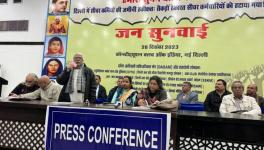UP: 8 Sanitation Workers Die in Past 10 Days Due to Hazardous Cleaning, Activists Call For FIR

Sanitation workers die in UP. Image credit: Mooknayak
On May 15, a press conference held at the Press Club of India under the banner of Dalit Adivasi Shakti Adhikar Manch (DASAM) and Justice News while expressing their concern over the “8 deaths due to manual scavenging in 10 days in Uttar Pradesh”, activists and advocates demanded that FIR be immediately lodged under Manual Scavenging Act and relevant sections of the Indian Penal Code against the culprits.
The conference was held by the Colin Gonsalves (Sr. Advocate), Roma Malik (General Secretary, AIUFWP), Indira Unninayar (Sr. Advocate) and Sanjeev Kumar (Secretary, DASAM).
The panel of activist and advocates said that in UP, despite the law prohibiting manual scavenging and hazardous cleaning under the Prohibition of Employment as Manual Scavengers and their Rehabilitation Act, 2013 and Supreme Court’s guidelines, state authority failed to prevent the incident of manual scavenging and responsible for not providing protective gears to the workers.
Talking to reporters, members of DASAM alleged that on May 2, a 57-year-old man and his 30-year-old son died while they were preparing a sewer line in Lucknow’s Wazirgang area. No officials from Jal Nigam visited the site for two hours and by the time they were taken to hospital, they were declared dead, they alleged.
8 workers dies within 10 days in Uttar Pradesh:
Recently, Uttar Pradesh witnessed 8 deaths within a short period 10 days due to manual scavenging.
On May 2, Shroban Yadav, 57, and his son Sushil Yadav, 30, were died while testing a sewer line in Lucknow’s Wazirganj area without safety equipment gears.
On May 3, two daily wage workers, Kokan Mandal, 40, and Nooni Mandal, 36, were died while cleaning the septic tank of a private residence in Noida Sector 26.
On May 9, four people died from inhaling toxic gases while cleaning the septic tank of a house in Mughalsarai, Chandauli. Three of the victims, Vinod Rawat, 35 Kundan, 42 and Loha, 23, were informal sanitation workers while the fourth victim was the son of the house owner who died while trying to save the workers.
A senior advocate of the Supreme Court and founder of Human Rights Law Network Colin Gonsalves said, “It is horrifying that workers are forced to enter sewer line without any protocol, machines or oxygen gears to clean sewer line.
The Prohibition of Employment as Manual Scavengers and their Rehabilitation Act, 2013:
Under the.” MS Act of 2013” Manual scavenging is a prohibited activity in India. The provisions of the Act provides that no person or agency can engage or employ any person for manual scavenging. Any person or agency who engages any person for manual scavenging in violation of the provisions of the MS Act, 2013 is punishable under Section 8 of the above Act, with imprisonment up to 2 years or fine up to Rs. 1 Lakh or both.
Radhika Bordia, an independent journalist, said two daily wage workers died on May 3 after inhaling toxic gases while cleaning a septic tank of a private residence in Noida Sector 26.
“Another incident was reported from Mughalsarai where four people were killed while cleaning septic tank of a private residence,” she said.
Bordia said that even after such incidents police do not take strict action. She further stressed that “Under the Manual Scavenging Act, there is a law to rehabilitate the family members of any victim, providing government job to one of the family members and proper compensation,” another activist Roma said, adding that the process was not being carried out.
Compensations not provided to the victims:
Roma Malik, a senior activist from the All India Union of Forest Working People said that “in October 2023 the Supreme Court ordered a compensation of 30 lakhs to the families of victims of manual scavenging which has not reached any of the victims so far. Allegedly, the District Administration promised to provide only ₹4 lakh ex gratia to each deceased in the incident in Chandauli. In India the lives of workers are considered cheap and inexpensive and they can only safeguard their rights through unionization”.
Get the latest reports & analysis with people's perspective on Protests, movements & deep analytical videos, discussions of the current affairs in your Telegram app. Subscribe to NewsClick's Telegram channel & get Real-Time updates on stories, as they get published on our website.
























